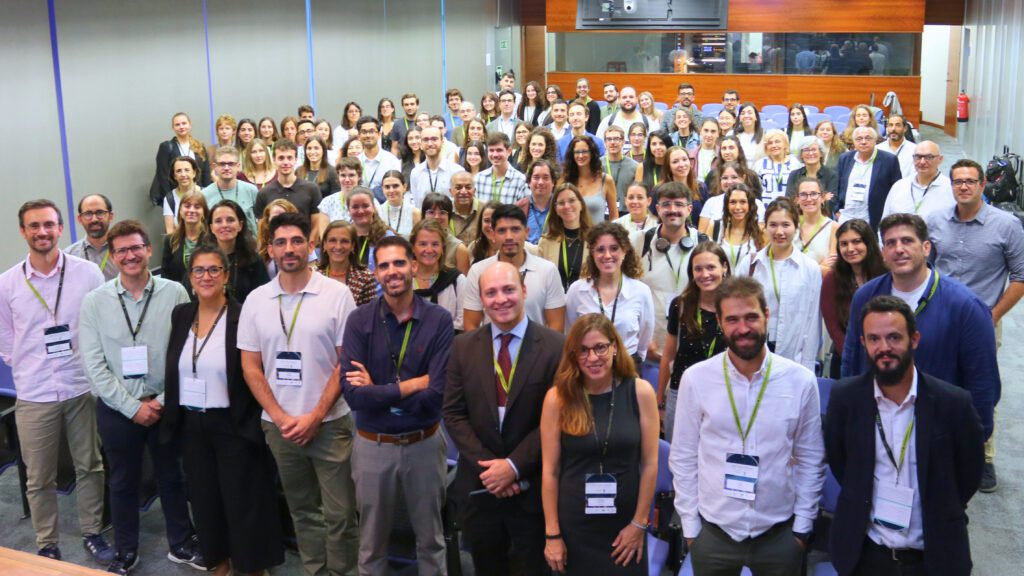The Institute for Bioengineering of Catalonia (IBEC) and the Spanish Society of Regenerative Medicine and Tissue Engineering (SEMIT) organized the inaugural SEMIT 2025 Congress. The event gathered leading national and international experts in regenerative medicine and tissue engineering, creating a unique platform for knowledge exchange among researchers, clinicians, and industry.

The inaugural SEMIT 2025 Congress took place on 2–3 October at the Barcelona Scientific Park (PCB), organised by the Institute for Bioengineering of Catalonia (IBEC) and the Spanish Society of Regenerative Medicine and Tissue Engineering (SEMIT).
With this first SEMIT Congress, we are creating a meeting point for the entire community working in regenerative medicine and tissue engineering in Spain. Our goal is to strengthen collaboration and accelerate the transfer of innovative solutions to clinical practice, ultimately improving people’s health and quality of life.
Zaida Álvarez Pinto
This first edition of the congress gathered leading national and international experts in regenerative medicine and tissue engineering, creating a unique platform for knowledge exchange among researchers, clinicians, and industry. The program combined plenary talks, keynote lectures, oral and flash presentations, poster sessions, networking opportunities, and a round table discussion on clinical translation.
The plenary sessions were delivered by four internationally recognized scientists: Abhay Pandit from the Centre for Research in Medical Devices (CÚRAM), Maria Pau Ginebra from the Universitat Politècnica de Catalunya, Manuel Salmerón from the University of Glasgow and IBEC, and Aitziber Cortajarena from CIC biomaGUNE. Their talks addressed key advances in biomaterials, tissue engineering and regenerative medicine, offering diverse perspectives that highlighted the international scope of the field.
In addition to these plenary contributions, the congress also featured keynote lectures by Maria Rosa Aguilar (CSIC), Marc Fernández Yague (Queen Mary University of London), José Carlos Rodríguez-Cabello (Universidad de Valladolid), Andrés Díaz Lantada (Universidad Politécnica de Madrid), Amaia Cipitria (Biogipuzkoa Health Research Institute) and Nadina Usseglio (Universidade da Coruña). These sessions provided in-depth insights into biofabrication, advanced biomaterials, smart responsive systems and disease modelling, sparking fruitful discussions among participants.
A highlight of the second day was the round table “Bridging Research and Practice: Clinical Challenges in Translational TERM,” which brought together Pedro Bernáldez (SportME Medical Center), Patricia Díaz Rodríguez (Universidade de Santiago de Compostela), Manuel Gómez Florit (IdISBa), and Begoña Castro (Histocell), fostering dialogue between academia, clinical practice, and industry.
In addition, the congress provided the opportunity to celebrate the General Assembly of SEMIT on the evening of October 2nd, strengthening the society’s role as a hub for collaboration and community building in Spain.
Founded in 2024, SEMIT is dedicated to advancing research and innovation in regenerative medicine and tissue engineering in Spain. Its mission is to foster collaboration across research, clinical practice, and industry, while supporting the translation of scientific discoveries into real solutions for health.
Zaida Álvarez Pinto, principal investigator of Biomaterials for Neural Regeneration group at IBEC and one of the founding members of SEMIT, emphasized the importance of this milestone:
“With this first SEMIT Congress, we are creating a meeting point for the entire community working in regenerative medicine and tissue engineering in Spain. Our goal is to strengthen collaboration and accelerate the transfer of innovative solutions to clinical practice, ultimately improving people’s health and quality of life.”
The SEMIT 2025 Congress marked the beginning of what will become the society’s flagship annual event, consolidating Barcelona as a hub for scientific dialogue and innovation in regenerative medicine and tissue engineering.





